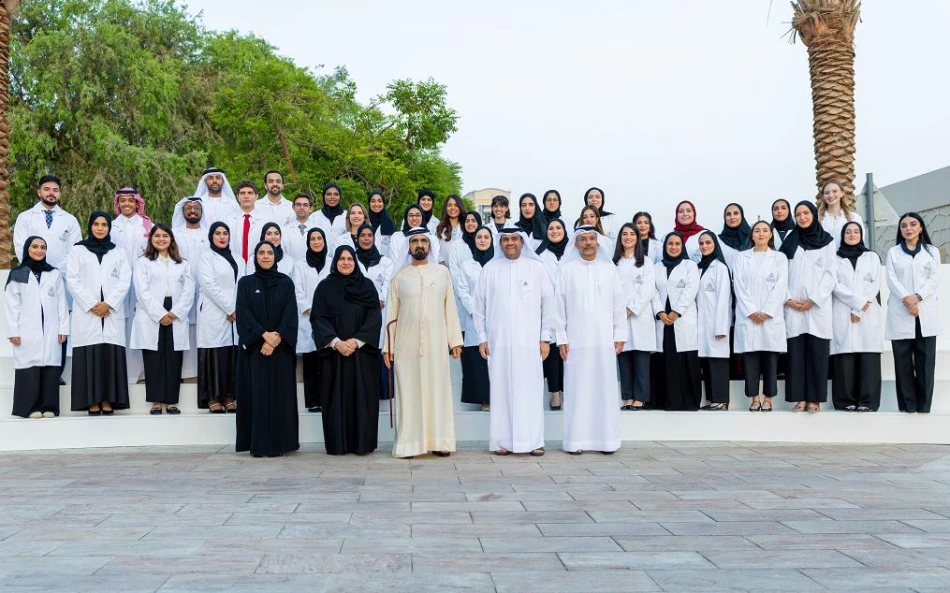
Dubai's Ruler Meets Top Graduates of Mohammed Bin Rashid University of Medicine and Health Sciences
Dubai's Medical Education Push Signals UAE's Ambition to Become Global Healthcare Hub
Sheikh Mohammed bin Rashid Al Maktoum, UAE Vice President and Prime Minister, recently met with the first graduating class of Mohammed bin Rashid University of Medicine and Health Sciences in Dubai, highlighting the Emirates' strategic push to establish itself as a regional leader in medical education and healthcare innovation. The meeting underscores Dubai's broader vision to transform from a trade and tourism hub into a knowledge-based economy anchored by high-value sectors like healthcare.
A Strategic Investment in Human Capital
During the meeting at the Union House in Dubai, Sheikh Mohammed praised the graduates' academic excellence, describing their achievements as evidence of the nation's capacity to "shape the future by nurturing promising minds across all sectors." His remarks reflect a calculated approach to economic diversification that positions healthcare as a cornerstone of the UAE's post-oil economy.
The university, established as part of Dubai's broader educational infrastructure development, represents more than just another medical school. It embodies the UAE's commitment to reducing dependence on foreign expertise while building domestic capabilities in critical sectors.
Regional Competition in Healthcare Excellence
The UAE's focus on medical education places it in direct competition with other Gulf states pursuing similar strategies. Saudi Arabia's Vision 2030 includes substantial investments in healthcare infrastructure and medical research, while Qatar has partnered with international universities to establish medical programs. However, Dubai's approach leverages its existing advantages as a regional business hub and its reputation for regulatory efficiency.
Singapore's Playbook
Dubai's strategy mirrors Singapore's successful transformation into a regional healthcare hub. Like Singapore, Dubai is building medical education capacity while simultaneously developing healthcare infrastructure and attracting international patients. The city-state's approach of combining medical tourism with research and education has generated significant economic returns—a model Dubai appears to be replicating.
Economic Implications for Healthcare Investment
For investors and healthcare companies, Dubai's emphasis on medical education signals several opportunities. The development of local medical talent reduces long-term operational costs for healthcare providers while creating a pipeline of professionals familiar with regional healthcare needs and cultural contexts.
The UAE's healthcare market, valued at approximately $19.5 billion in 2023, is projected to grow significantly as the population ages and medical tourism expands. Local medical graduates represent a crucial component of this growth, potentially reducing the healthcare sector's dependence on expensive expatriate professionals.
Beyond Medical Training: A Knowledge Economy Vision
Sheikh Mohammed's emphasis on the university becoming a "beacon of modern science" and a "platform for graduating tomorrow's leaders in medicine and scientific research" reveals ambitions that extend beyond basic medical training. The UAE appears to be positioning itself as a regional center for medical research and innovation, potentially attracting pharmaceutical companies and medical technology firms.
This approach aligns with global trends where countries are leveraging medical education as an anchor for broader healthcare ecosystems. Ireland's success in attracting pharmaceutical manufacturing and Switzerland's dominance in medical research demonstrate how specialized education can catalyze entire industry clusters.
Challenges and Competitive Advantages
While the UAE's medical education push shows promise, it faces significant challenges. Regional political tensions, competition from established medical education centers, and the need to maintain international accreditation standards will test the sustainability of this strategy.
However, Dubai's advantages—including political stability, world-class infrastructure, and a business-friendly regulatory environment—provide a strong foundation. The city's position as a regional hub for multinational corporations also offers unique opportunities for medical graduates to gain diverse experience.
The success of Mohammed bin Rashid University's first graduates will serve as a crucial test case for the UAE's broader ambitions in healthcare and medical education, potentially influencing similar initiatives across the region.
Most Viewed News

 Sara Khaled
Sara Khaled






